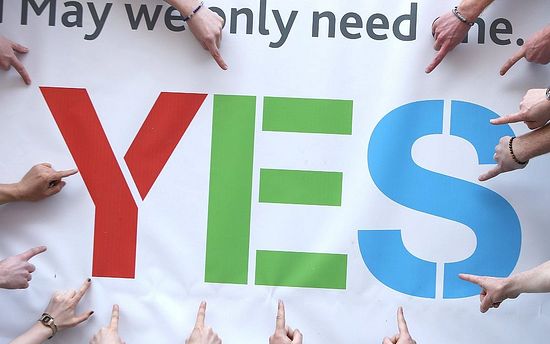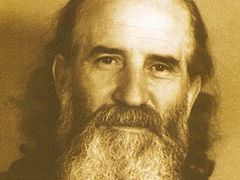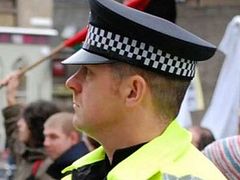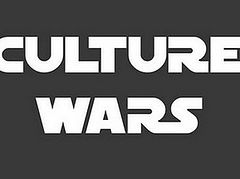Source: Independent.ie
Brendan O'Neill
A New Ireland has been born. That's the consensus following the victory of Yes in the referendum. Ireland has finally broken free of its dark, intolerant, baby-burying past, and has emerged blinking into the light of the gay-friendly, rainbow-hued 21st century.
It's a tantalising (and also patronising) moral narrative: the redneck Catholic country on the Western corner of Europe coming in from the cold and taking its place at the seat of civilisation.
But how true is it? Has Ireland overnight morphed from an intolerant nation into the youngest and freshest faced proper democracy?
I'm not buying it. On the contrary, the most striking thing about the Yes camp has been its intolerance: its hostility to dissent; its demonisation of its opponents; the casualness with which it wrote off swathes of Ireland as bigots, cretins, unfit for modern public life.
This is the disturbing irony of the Yes camp: it presents itself as the historic antidote to the backwardness of old Catholic Ireland, yet it rehabilitates, in updated lingo, the intolerance of Old Ireland.
This so-called New Ireland might prefer the rainbow flag to the tricolour, and the wearing of Yes badges over the donning of crucifixes, but it is not as different to the Old Ireland as it likes to imagine.
It became clear in the final weeks of the referendum campaign that it was no longer really about gay marriage. The political chatter became less about equality, and more about Ireland's global moral reputation.
Enda Kenny said a Yes victory would "send out a powerful signal internationally that Ireland has evolved into a fair, compassionate and tolerant nation". Stephen McIntyre of Twitter said Yes would enhance "Ireland's international reputation".
The referendum was only ostensibly about who may say "I do". More fundamentally, in the eyes of Ireland's political, business and chattering elites, it was an opportunity for this troubled nation to re-imagine itself.
It was a chance for Ireland to address its post-Catholic, post-nationalist identity crisis and magic up an instant shiny new identity as an "evolved" nation of gay-friendliness and political correctness.
Kenny's use of the Darwinesque word "evolved" - also used by Barack Obama to describe his embrace of gay marriage - was telling.
The implication is that Ireland had hitherto been a bit of a knuckle-dragger, and it was only through saying Yes to gay marriage that it could propel itself into upright, opposable-thumbs modernity. To be against gay marriage is to linger in the doldrums of half-formed humanity; to favour gay marriage is to be decent, civilised, "evolved".
This moralisation of the referendum, the transformation of Yes into a vote for civilisation and No into a vote for a pre-evolved way of life, meant intolerance became inevitable.
With gay marriage turned into a litmus test of one's moral worth, those on the No side found themselves demonised, treated in the same way Old Ireland might have treated teen fornicators or godless boozers: pariahs, with no place among the decent. Where Old Ireland damned certain ideas as heresy, the Yessers of the New Ireland write off opposition to gay marriage as a kind of disorder.
The Psychological Society of Ireland - psychologists having apparently replaced priests as Ireland's moral arbiters - said it was worried that the No camp's propaganda could "impact detrimentally on people".
A writer for the Irish Times proposed the establishment of a homophobia watchdog to "monitor the destructive rhetoric" of the No side - just as the Vatican once had a list of banned books, the Index Librorum Prohibitorum, through which it monitored the influence of "evil" ideas.
Where Old Ireland worried about godless thinking having a morally corrupting impact on the populace, New Ireland thinks anti-equality arguments will have a psychologically destabilising impact. Both share a deeply censorious instinct.
Old Ireland thought nothing of writing off as "sinners" anyone who refused to bow before the One True Apostolic Church - New Ireland brands as "bigots" all those who refuse to accept its new gospel truths.
When Rory O'Neill (no relation) referred to religious opponents of gay marriage as homophobic, he was expressing New Ireland's elitist view of religious belief as a form of hatred, a "phobia": an irrational fear, driven not by moral thought but by murky panic. In short, they're sinful thinkers, and must be cast out.
This instinct to cast out of polite society those who oppose gay marriage, in the same way Old Ireland cast out heretics or misbehavers, was much in evidence on Twitter.
To peruse the #VoteYes hashtag was to peer into a deep well of intolerance. Those who vote No have "no place in modern society", said one tweeter.
And just as it was the done thing in Old Ireland to expect dutiful genuflection before the right kind of iconography - crosses, the Angelus, those lonely Virgin Marys in glass cases on roadsides - so the New Ireland has a lot of iconography too.
The gay flag has replaced the crucifix as the marker of decency you should hang from your windows.
The Yes badge now plays a similar role to a St Vincent de Paul badge in the past: it lets people know you're good, right thinking, a deserving citizen of New Ireland.
And if you wear a No badge? Well, good luck. It's the upside-down crucifix of the 21st century.
So how new is this New Ireland, really? Sure, those who felt more comfortable in Old Ireland - country people, older people, priests - have been given a thorough thrashing by the Yes lobby. But that lobby has used the same demonology and censoriousness that was rampant in Old Ireland, only to different ends.
Ireland has emerged, not into a new era of tolerance, but into the age of illiberal liberalism, where, in a profound irony, those who don't like the so-called "liberal outlook" find themselves vilified and silenced.
At least Old Ireland was honest: you either loved God or you were in trouble. The New Ireland shares Old Ireland's intolerance, but lacks its honesty, depicting itself as a stormtrooper for openness and equality when it is nothing of the sort.







